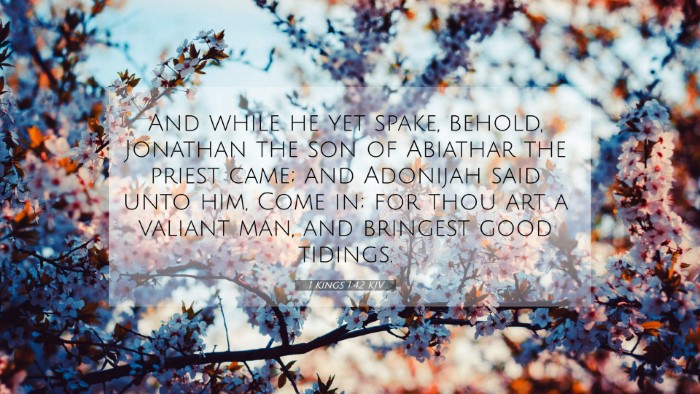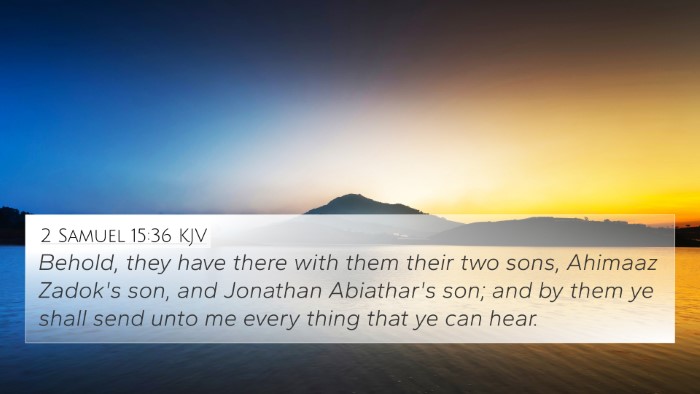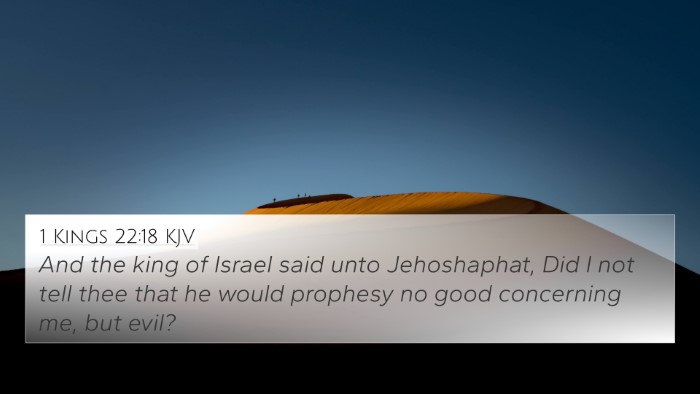Understanding 1 Kings 1:42: Commentary Insights
The Bible verse 1 Kings 1:42 states: "And while he yet spake, behold, Jonathan the son of Abiathar the priest came: and Adonijah said unto him, Come in; for thou art a valiant man, and bringest good tidings." This passage serves as a pivotal moment in the narrative of King David's succession, revealing themes of loyalty, intrigue, and divine purpose. The following analysis draws from public domain commentaries, particularly those of Matthew Henry, Albert Barnes, and Adam Clarke, to provide a comprehensive understanding of this verse.
Contextual Background
To better understand 1 Kings 1:42, we must consider the broader context of King David's reign and the struggle for succession. Following King David’s advanced age, a struggle arose between his sons, particularly Adonijah and Solomon, for the throne. Adonijah, attempting to secure power, was hosting a feast, whereas Solomon was chosen by David to succeed him.
Key Themes in 1 Kings 1:42
- Loyalty and Treachery: Jonathan’s arrival indicates shifting loyalties. His relationship with David is contrasted with Adonijah’s claim to the throne.
- The Role of Divine Providence: Jonathan's presence suggests the unfolding of God's will regarding Solomon's ascension.
- The Nature of Good Tidings: This passage highlights how information regarding David's plans brings good news to some characters while creating tension for others.
Commentary Insights
Matthew Henry's Commentary
Matthew Henry notes that Jonathan’s role as a messenger plays a crucial part in the narrative. He reflects on the significance of being a "valiant man," suggesting that true bravery is shown in loyalty to God’s appointed leader, which in this context is Solomon.
Albert Barnes' Notes
Barnes emphasizes the political implications of Jonathan's message. His arrival signifies critical news that will impact the unfolding events surrounding the throne. Barnes suggests that the characterization of Jonathan as "valiant" implies not only physical courage but also moral integrity in the face of potential conflict.
Adam Clarke's Commentary
Clarke provides insights into the title of "valiant man." He argues that Jonathan’s bravery is evident in his willingness to deliver news that could be dangerous, tipping the balance in favor of Solomon. Clarke also highlights the importance of the priesthood in the kingdom and suggests that Jonathan's lineage plays a strategic role in the king's affairs.
Bible Cross References
This verse can be linked to several other scriptures that illuminate its meaning and thematic connections:
- 1 Samuel 16:13 - The anointing of David serves as a backdrop for the struggle over kingship.
- 1 Kings 1:34 - Solomon’s anointment as king signifies the culmination of the narrative.
- 2 Samuel 15:12 - The conspiracies surrounding David’s reign connect to the treachery faced by Solomon.
- 1 Kings 2:1-4 - David’s final instructions to Solomon emphasize the importance of following God's ways.
- 1 Samuel 20:30-31 - The conflict between Jonathan and Saul can be contrasted with Jonathan’s loyalty to David.
- Proverbs 29:2 - The connection between righteous leaders and the well-being of the people relates to this passage.
- Matthew 20:26-28 - Servanthood and leadership resonate with the themes of rightful authority present in the story of David's succession.
Inter-Biblical Dialogue
1 Kings 1:42 invites a broader exploration of themes found throughout Scripture. The dynamic between self-interest in leadership and the divine mandate can be seen in the narrative of Saul’s rise and fall as well as Jesus’ teachings on servant leadership. This creates an inter-Biblical dialogue that enriches our understanding of God’s sovereignty in the appointment of leaders.
Conclusion
1 Kings 1:42 serves as a poignant reminder of the complexity of leadership, loyalty, and divine purpose as seen throughout biblical history. By reflecting on the insights from public domain commentaries and exploring cross-references, we gain a deeper understanding of how this verse fits into the greater narrative of Scripture. As we engage in comprehensive Bible studies using various cross-reference tools, we are better equipped to discern the connections between different Bible verses, enhancing our understanding and application to our lives.










